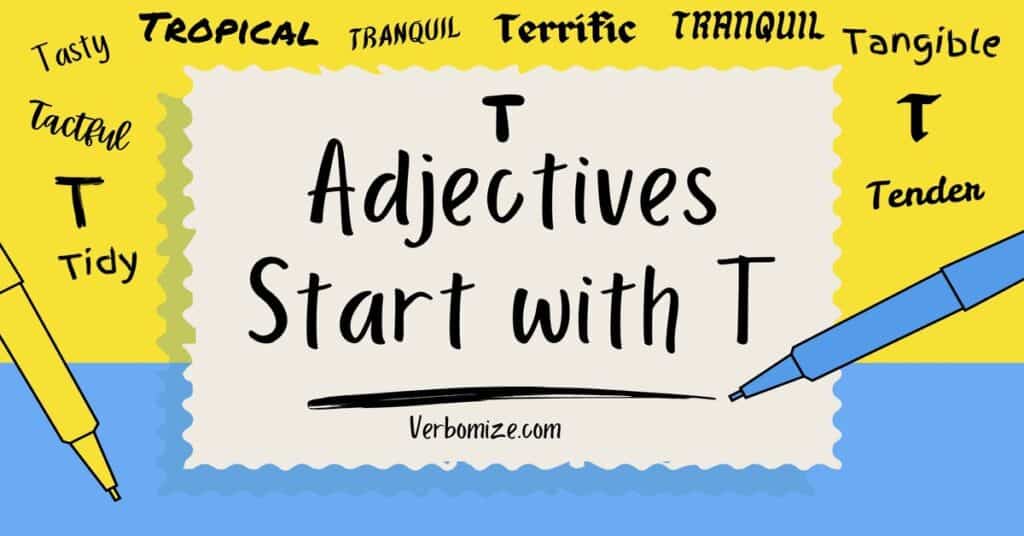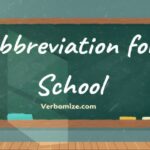Adjectives that start with T are a treasure trove of vibrant, expressive words that can really elevate your writing. Whether you’re crafting a story, describing a scene, or simply looking to spice up your vocabulary, these T-adjectives are the perfect tool to bring your language to life.
In this article, you’ll discover a wide range of T-adjectives that are as exciting as they are versatile. Get ready to unlock new ways to describe anything from people to places, and add that extra flair to your everyday conversations. Let’s dive in!
What is an Adjective that Starts with T?
An adjective starting with the letter ‘T’ is a word that describes or alters a noun. It provides more details about the subject, such as its appearance, emotions, or behavior. Examples include “tall,” “tender,” “timid,” and “turbulent.” These adjectives help us better understand the characteristics of the people, places, or things we’re talking about.
Using “T” adjectives adds depth to our language, making descriptions more vivid. For instance, saying someone is “trusting” highlights their reliability, while “turbulent” conveys a sense of chaos. These words enhance communication by offering more specific details about the world around us.
The Impact of Adjectives in Communication
Adjectives are not just about adding flair to sentences—they help convey emotions, set the tone, and provide clarity. Imagine you’re describing a person, place, or thing. Instead of simply stating, “It was a good day,” you could say, “It was a thrilling, triumphant day.” The right adjectives transform an ordinary sentence into something more compelling and memorable.
When you’re searching for adjectives that start with “T,” the possibilities are endless, from traits that describe people to terms that describe experiences or objects. Let’s break them down!
positive adjectives start with t
Positive adjectives can inspire and motivate others. These are words that give your writing energy and positivity.
- Tangible – Something you can perceive with your senses.
- Tolerant – Open-minded and accepting of others’ differences.
- Terrific – Something outstanding or great in quality.
- Thriving – Flourishing or growing vigorously.
- Tasty – Delicious or full of flavor.
- Tender – Gentle or soft in manner or feeling.
- Transparent – Easy to understand or open, without deceit.
- Triumphant – Feeling or showing victory or achievement.
- Trustworthy – Reliable and deserving of confidence.
Example: After months of hard work, Sarah’s triumphant smile spoke volumes as she held her certificate of achievement.
Descriptive Adjectives for People
When talking about a person, choosing the right adjective can portray their personality or appearance in a more detailed and engaging way.
- Talented – Highly skilled or gifted.
- Tactful – Skillful in dealing with delicate situations.
- Thoughtful – Showing consideration and care for others.
- Teachable – Open to learning or accepting new ideas.
- Trendy – Fashionable or in line with current trends.
- Turbulent – Characterized by confusion, unrest, or chaos.
- Tenacious – Holding firm to goals or beliefs.
- Temperamental – Likely to change moods unpredictably.
- Tidy – Neat and organized.
- Tough – Resilient and strong, often in difficult circumstances.
Example: Mark’s tenacious spirit allowed him to overcome every obstacle and reach the top of his field.
Adjectives for Places and Environments
Describing environments and places effectively sets the scene and helps readers or listeners imagine the location clearly.
- Tranquil – Calm, peaceful, and undisturbed.
- Turbulent – Full of disorder, instability, or storminess.
- Timeless – Not affected by the passage of time; classic and enduring.
- Tropical – Relating to the tropics, often used to describe lush, warm climates.
- Towering – Very tall or impressive.
- Teeming – Overflowing with people, animals, or things.
- Tattered – Worn or torn from use or age.
- Tidy – Neat and clean, free of clutter.
- Trendy – Modern or fashionable in design.
- Totally isolated – Completely separated or removed from others.
Example: The tropical island was teeming with vibrant wildlife and lush greenery, making it a paradise for nature lovers.
negative adjectives that start with t
Sometimes, we need adjectives to convey difficulty, challenges, or negative qualities, and these T for adjective words fit the bill.
- Tense – Stretched tight or nervous.
- Tacky – Cheap or lacking in style.
- Turbulent – Full of unrest or confusion, often used to describe a rough period.
- Tragic – Extremely sad, often involving death or disaster.
- Tedious – Boring and repetitive.
- Tense – Nervous, strained, or under pressure.
- Tyrannical – Characterized by the harsh or oppressive rule of a tyrant.
- Trivial – Of little importance or significance.
- Tiring – Causing exhaustion or fatigue.
- Temperamental – Subject to sudden and unpredictable changes in mood or behavior.
Example: The long, tedious meeting drained everyone’s energy, leaving them eager for a break.
Adjectives Describing Emotions
Emotions play a significant role in how we communicate, and the right adjective can capture a feeling more vividly.
- Tenderhearted – Showing a lot of compassion and sympathy.
- Tragic – Evoking sadness, often related to loss or disaster.
- Triumphant – Feeling victorious or having overcome obstacles.
- Terrified – Experiencing great fear or anxiety.
- Touched – Moved emotionally, often in a sentimental way.
- Thrilled – Experiencing extreme excitement or joy.
- Timid – Lacking confidence, shy.
- Tense – Feeling nervous or anxious, often due to pressure.
- Tranquilized – Calm or sedated, often due to overwhelming peace or relief.
- Tortured – Experiencing extreme mental or emotional distress.
Example: After receiving the heartfelt letter, she felt deeply touched, moved by the words that seemed to resonate with her soul.
Adjectives for Appearance or Physical Features
Whether it’s describing a person, place, or object, appearance is often the first thing we notice, and these adjectives that beginning with t capture that perfectly.
- Thickset – Having a compact, stocky build.
- Tremulous – Shaky or quivering, often in response to fear or emotion.
- Toned – Well-defined, usually referring to muscles or body shape.
- Translucent – Partially see-through, allowing light to pass through but not clear.
- Tidy – Neat and well-organized, often used for appearance.
- Tattered – Worn and ragged, often referring to clothing or fabric.
- Tapered – Narrowing or becoming thinner toward one end.
- Taut – Stretched tight, often used to describe skin or muscles.
- Twirling – Spinning or twisting in a circular motion, often used to describe movement.
Example: The old leather jacket was tattered from years of use, yet it still held an air of vintage charm.
adjectives start with t to describe person
These adjectives focus on describing people’s behaviors or character traits, offering deeper insights into their actions and motivations.
- Temperate – Showing moderation or self-restraint, especially in behavior.
- Tactile – Enjoying or responding to touch, physical interaction.
- Tolerant – Open-minded, accepting differences or opposing views.
- Teasing – Playfully mocking or making fun of someone in a lighthearted way.
- Turbulent – Characterized by instability or unrest, often describing personality shifts.
- Tough-minded – Practical, logical, and determined in thinking.
- Tangible – Clear, real, and perceivable, often referring to someone’s contributions.
- Tricksy – Deceptive or mischievous, often in a playful manner.
- Trusting – Willing to rely on others, often without suspicion.
- Tactful – Skillful in managing delicate or sensitive situations.
Example: Despite his tough-minded approach to business, he was incredibly trusting when it came to personal relationships.
good adjectives start with t
From the softest whispers to the loudest roars, sound adjectives beginning with T can help create a dynamic atmosphere in your writing.
- Tinkling – A light, clear, or musical sound, like bells or glass.
- Thunderous – Very loud, often associated with thunder or a powerful noise.
- Tripping – Moving in a way that suggests stumbling or light, uneven steps.
- Twirling – Spinning or rotating in circles.
- Tapping – A gentle, rhythmic sound, often produced by light pressure.
- Thundering – Powerful and loud, often describing the sound of storms or heavy impact.
- Teeming – Overflowing with activity, often used for movement or noise in large crowds.
- Trudging – Walking slowly and with heavy steps, often due to fatigue or effort.
- Twirling – Spinning rapidly, often used to describe dance or playful movement.
- Tossing – Throwing something lightly or carelessly.
Example: The thunderous sound of the storm echoed through the valley, making the windows shake.
Adjectives for Objects and Things
Describing everyday objects can be more engaging when you use specific adjectives that start with t that highlight their features or qualities.
- Trendy – In line with the latest fashion or style.
- Tactile – Able to be touched or felt.
- Teardrop-shaped – Having the shape of a tear, often used to describe objects or jewelry.
- Tinsel-like – Shiny and reflective, often used to describe decorations or surfaces.
- Turbine-powered – Operating or powered by a turbine, often used for machines or engines.
- Transparent – See-through, allowing light to pass through.
- Tempered – Strengthened by treatment, often used to describe glass or metal.
- Textured – Having a surface that is rough, smooth, or uneven.
- Tidy – Neat and orderly in appearance.
- Trapezoidal – Shaped like a trapezoid, with two sides parallel and the other two sides angled.
Example: The tinsel-like decorations shimmered in the sunlight, adding a touch of glamour to the festive atmosphere.
Adjectives Describing Time or Change
Time is a theme that we often describe in various ways, especially when speaking about change, aging, or stages of development.
- Tardy – Late or delayed, often referring to someone’s arrival.
- Transitory – Short-lived or temporary, often used to describe phases or states.
- Tenacious – Holding firm to something, particularly ideas, through changing times.
- Tenuous – Weak or slight, often describing something fragile or not lasting.
- Tidal – Related to or affected by tides, often used metaphorically for cycles of change.
- Tipping – Approaching a point of change or balance.
- Transient – Temporary or fleeting, often describing a period or event.
- Twirling – Spinning in a way that suggests continuous, cyclical movement.
- Teeming – Overflowing, often used to describe an environment or situation in flux.
Example: The transient beauty of the sunset left the group speechless, knowing it would soon fade into the night.
Adjectives for Personality Traits
Understanding and describing personality is key in communication. These adjectives will help you paint a clearer picture of someone’s character.
- Tactful – Able to handle sensitive matters or situations delicately.
- Tender – Showing care and kindness toward others.
- Temperate – Exhibiting self-restraint and moderation, particularly in behavior.
- Tolerant – Open-minded and willing to accept others’ differences.
- Turbulent – Unpredictable or characterized by instability.
- Timid – Shy or lacking in self-confidence.
- Trusting – Willing to rely on others without suspicion or doubt.
- Tricky – Difficult to handle or requiring caution.
- Tough – Mentally or physically strong, often in challenging circumstances.
Example: Emily’s tactful approach to resolving conflicts made her the ideal mediator in the office.
Adjectives for Visual Descriptions
These adjectives are perfect for enhancing your descriptions of visual details, whether it’s an object, a scene, or a person.
- Tawny – A warm, brownish-yellow color.
- Transparent – Allowing light to pass through, clear.
- Tattered – Torn or worn out, often used to describe fabric or clothing.
- Taut – Stretched tightly, often referring to skin or materials.
- Teardrop-shaped – Shaped like a drop of water or tear.
- Textured – Having a rough or smooth surface.
- Tightly-knit – Close-knit, usually referring to a group of people or materials.
- Twirling – Spinning or rotating in a circular motion.
- Trapezoidal – Shaped like a trapezoid, with parallel sides and angled edges.
Example: The old, tattered curtains hung in the window, their fabric frayed from years of wear.
Adjectives for States of Being
These adjectives describe different states of existence or being, whether they refer to a physical, mental, or emotional condition.
- Tired – Feeling the need for rest or sleep, often due to exertion.
- Tranquil – Calm, peaceful, and free from disturbance.
- Tense – In a state of nervousness or anxiety, often due to pressure.
- Turbulent – Characterized by upheaval or disorder, often used to describe emotions or situations.
- Teeming – Overflowing, usually with people, animals, or activity.
- Totally depleted – Completely exhausted or drained of energy.
- Tingling – A sensation of slight discomfort or excitement, often on the skin.
- Triumphant – Feeling or showing victory after a struggle or challenge.
- Tightly-wound – Extremely tense, often referring to someone who is nervous or anxious.
- Trembling – Shaking or quivering, often due to fear, cold, or excitement.
Example: After a long week, Sarah felt totally depleted, longing for some rest and relaxation.
Adjectives for Movement and Action
Movement can be described in a variety of ways, and these adjectives help capture dynamic actions or states of motion.
- Twirling – Spinning or rotating in a playful or lighthearted manner.
- Treading – Stepping or walking carefully, often in a cautious manner.
- Tossing – Throwing lightly or carelessly.
- Trudging – Walking slowly and with effort, typically due to fatigue.
- Tipping – Causing something to tilt or shift from its normal position.
- Tapping – Lightly striking or touching something, usually in a rhythmic way.
- Tightening – Making something more secure or compact.
- Teetering – Wobbling or unsteadily balancing on the edge.
- Tearing – Ripping or pulling something apart forcefully.
- Trotting – Moving at a moderate, steady pace, typically used for animals like horses.
Example: The dog was trotting happily through the park, its tail wagging in excitement.
Adjectives for Feelings and Emotions
Emotions are essential to human experience, and these adjectives help articulate a variety of emotional states.
- Terrified – Filled with intense fear or dread.
- Tolerant – Accepting of different views, behaviors, or people.
- Thrilled – Filled with great excitement or pleasure.
- Tenderhearted – Sensitive and compassionate, especially toward others.
- Tragic – Causing great sorrow or distress.
- Touched – Moved emotionally, often in a sentimental way.
- Triumphant – Experiencing or feeling victory or success.
- Turbulent – Characterized by emotional upheaval or chaos.
- Tense – Feeling nervous or strained, often due to anxiety.
- Timid – Lacking in confidence, shy or hesitant.
Example: After hearing the touching story, Jane was so tenderhearted that she couldn’t help but cry.
Adjectives for Size and Quantity
When describing the size, quantity, or scale of something, these adjectives come in handy.
- Tiny – Very small in size.
- Tremendous – Extremely large, powerful, or impressive.
- Tidy – Neat, organized, or compact.
- Trivial – Of little importance or significance.
- Teeming – Overflowing with something, often used to describe large quantities of people or things.
- Tight – Close-fitting, often referring to clothing or containers.
- Tensile – Capable of being stretched or pulled, often used for materials.
- Tolerable – Bearable in quantity or intensity.
- Tidal – Relating to the flow of tides, often used metaphorically to describe something that rises and falls.
Example: The tiny ant carried food back to its colony, showing how even the smallest creatures contribute to the whole.
Adjectives for Texture and Surface
Texture is an essential part of sensory experience, and these adjectives describe the feel or surface qualities of various objects.
- Tacky – Sticky or somewhat unpleasant in texture.
- Threadbare – Worn out or shabby due to overuse, often referring to fabric.
- Tactile – Related to the sense of touch, often used to describe something that can be felt physically.
- Trenchant – Sharply defined or cutting, often used metaphorically to describe something clear or distinct.
- Tortured – Distorted or deformed, often used to describe an object or form in pain or anguish.
- Tumescent – Swollen or distended, often describing something that is full or puffed up.
- Tissue-like – Thin, fragile, or soft, like tissue paper.
- Tough – Hard and durable in texture, often used to describe materials.
- Turbid – Murky or cloudy, often referring to liquids or substances.
- Textured – Having a surface with varying levels or qualities, such as rough or smooth.
Example: The fabric felt smooth and tactile under her fingers, with a luxurious texture that was both soft and elegant.
Adjectives for Conditions or States of Health
These adjectives describe various health states or physical conditions, ranging from illness to vitality.
- Tired – Experiencing fatigue or the need for rest.
- Tumultuous – In a state of chaos, often referring to mental or emotional turmoil.
- Throbbing – Pulsing or aching, typically used to describe pain.
- Torpid – Inactive or sluggish, often used to describe a lack of energy or vitality.
- Tender – Sensitive to the touch, often used to describe sore or injured areas.
- Taut – Stretched tightly, often referring to muscles or skin.
- Temporarily impaired – Experiencing a temporary loss or reduction in capability, usually referring to physical or mental abilities.
- Totally recovered – Having fully healed or regained health.
- Tight – Used to describe tightness in muscles, often indicating strain or tension.
- Tragic – Referring to a health-related situation causing great sorrow or loss.
Example: His throbbing headache made it difficult for him to concentrate on anything for too long.
Using “T” Adjectives Effectively in Your Writing
When you incorporate adjectives into your speech or writing, remember that balance is key. Too many descriptive words can overwhelm the reader, while too few can leave your message flat. Here are a few tips for effectively using adjectives like the ones above:
- Be Specific: Instead of using broad adjectives, try to be more precise. For example, For instance, instead of calling someone ‘nice,’ you could say they’re ‘tactful’ or ‘thoughtful.'”
- Match Tone to Purpose: Choose adjectives that match the overall mood you want to convey—whether it’s a positive atmosphere or a more somber tone.
- Vary Your Vocabulary: Don’t overuse the same adjective in a short passage. Mix in synonyms for variety and rhythm.
Conclusion: The Power of “T”
Adjectives are an essential part of language, enriching both written and spoken communication. By learning and using a variety of adjectives, especially those that begin with the letter “T,” you can enhance your descriptions and convey ideas more clearly and creatively. The words listed here—from tolerant to turbulent—can help you communicate with greater nuance and precision, whether you’re writing a novel, delivering a speech, or simply having a conversation.
So, next time you sit down to write or speak, remember the power of a well-chosen adjective. You just might find that your message is clearer, your narrative more engaging, and your ideas more impactful.
MCQ Quiz: Adjectives That Start with T
- What is an adjective?
- A) A word that shows action
- B) A word that describes a noun
- C) A word that replaces a noun
- D) A word that connects phrases
- Which of the following is an example of an adjective starting with “T”?
- A) Quick
- B) Tall
- C) Bright
- D) Heavy
- What does the adjective “tender” describe?
- A) A person’s height
- B) A person’s gentle and caring nature
- C) A person’s energy level
- D) A person’s intelligence
- Which of the following adjectives starting with “T” would describe a storm?
- A) Trusting
- B) Turbulent
- C) Tidy
- D) Timid
- What does the adjective “timid” describe?
- A) Someone who is confident
- B) Someone who is shy or lacking in confidence
- C) Someone who is energetic
- D) Someone who is loud
- How does using adjectives like “tender” or “turbulent” affect communication?
- A) Makes communication confusing
- B) Makes descriptions more vivid and precise
- C) Makes writing less interesting
- D) Makes people talk less
- Which of these adjectives would best describe a relationship based on trust?
- A) Tacky
- B) Trusting
- C) Tangy
- D) Tense
- What is the main function of adjectives that start with “T”?
- A) To show action
- B) To describe or modify a noun
- C) To replace verbs
- D) To connect clauses
- Which of the following adjectives best describes something with a calm or peaceful atmosphere?
- A) Tense
- B) Taut
- C) Tranquil
- D) Tattered
- What type of word is “tawny”?
- A) A noun
- B) A verb
- C) An adjective describing color
- D) An adverb

Jone Smith is an experienced blogger and content creator behind Verbo Mize. With a passion for storytelling and insightful commentary, Jone brings a wealth of knowledge on diverse topics. His expertise in blogging, combined with a keen eye for detail, makes his work both informative and engaging, offering readers valuable perspectives on a wide range of subjects.







